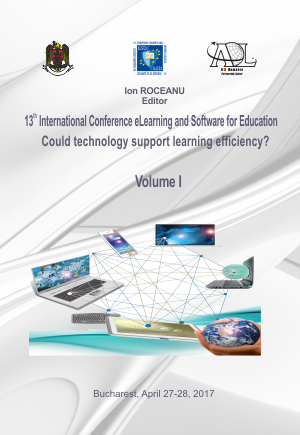NON-COGNITIVE SKILLS: WHAT STUDENTS NEED AND EMPLOYERS REQUIRE - THE ROLE OF CONTEXTUAL LEARNING IN A BLENDED ENVIRONMENT
NON-COGNITIVE SKILLS: WHAT STUDENTS NEED AND EMPLOYERS REQUIRE - THE ROLE OF CONTEXTUAL LEARNING IN A BLENDED ENVIRONMENT
Author(s): Cristina Felea, Liana StancaSubject(s): Social Sciences, Education, Higher Education
Published by: Carol I National Defence University Publishing House
Keywords: contextual learning; graduate employability; non-cognitive skills; social skills.
Summary/Abstract: European statistical data (2015) show that the employment rates of graduates aged 20-34 are lowest for those in search of their first job. This may reflect not only issues related to job market fluctuation, but also difficulties in matching educational outcomes and labour market needs, which is an issue known to be a key component of the Europe 2020 strategy. In Romania, the transition to competence-based curricula and an increasing number of university partnerships with companies have contributed to raise student employability. However, there are multiple signals that there seems to be an important skills gap that makes transition to work difficult and costly for both employees and employers. In this respect, the authors’ research on professional and transversal competences within technology-based blended learning environments, personal observation, discussion with students and colleagues from the industries, as well as a growing number of studies on success factors in higher education, career and life during the 21st century, have revealed the need for a complex mindset that includes cognitive and non-cognitive skills. It is also known that, in spite of agreeing on a certain set of core professional and transversal competences, higher education institutions and employer value differently these factors. Increased attention has been paid to modalities to develop social-emotional and affective skills (SEA), which are said to favour academic and career success. The major categories include: approach to learning, intrapersonal skills and social skills. The present study is based on the assumption that contextual learning may be a useful addition to the blended learning environment in place so as to help identifying which SEA skills are more important for career readiness and creating premises for their implementation. For this purpose, we created a non-formal learning context (workshop) bringing together students, teachers and IT professionals with the aim of raising students’ awareness of models of organizational and work culture and practitioners’ view on future employees’ essential competences needed for an efficient and smooth integration on the job market. Then, the impact of the event was surveyed with the help of a questionnaire applied at the end of the event. The results of data analysis are expected to provide suggestions to align and supplement skills needed by graduates with existing curricular provisions. Additionally, it could indicate directions for further exploration of the role and value of non-cognitive skills for all actors involved and blended learning solutions to improve them.
Journal: Conference proceedings of »eLearning and Software for Education« (eLSE)
- Issue Year: 13/2017
- Issue No: 01
- Page Range: 140-147
- Page Count: 8
- Language: English

